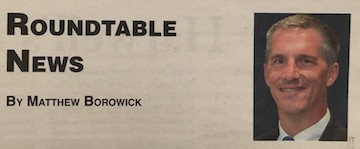Civil War News’ Matthew Borowick

As part of our series with Civil War News, ECW is pleased to welcome Matthew Borowick.
 Civil War round tables. They’ve been around a long time, dating back to the oldest one, The Civil War Round Table, born in 1940 in Chicago. Today, hundreds of round tables around the world provide people of various ages, races, opinions and expertise a forum to discuss this period in our nation’s history.
Civil War round tables. They’ve been around a long time, dating back to the oldest one, The Civil War Round Table, born in 1940 in Chicago. Today, hundreds of round tables around the world provide people of various ages, races, opinions and expertise a forum to discuss this period in our nation’s history.
Round tables differ in the ways they are run, how often they meet, the trips they take and how formal they are. Some conduct their meetings over dinner. Others involve a few people debating a given topic. They are wholly independent of each other and not chapters of a larger corporate hierarchy.
Yet, Civil War round tables (CWRTs) play an essential role in the study of The War Between the States. That role ensures the sacrifices made by those men and women many years ago shall never be forgotten, or bulldozed over, or erased from the history books.
Yet, many round tables struggle. In fact, it is estimated that 64 round tables have ceased operation over the past decade. Is a decline in CWRT attendance the “new normal?”
In 2004, with these things in mind, I sent a proposal to Kay and Pete Jorgensen, the then-editors and publishers of Civil War News. I suggested a regular column about round tables, for round tables. It would be designed to share “best practices,” about what has worked (or not worked) for each of them.
My hope was to provide these independent organizations and their leaders valuable information and a network of kindred minds. The column would give round table members a place to share their “secrets to success.” Sharing those secrets could only help.
Over the years I have interviewed round table leaders near and far. From Belgium to Boston, from Australia to Augusta, from Puget Sound to Philadelphia, dedicated leaders have shared their insights.
We have explored common issues, including managing volunteers, governance, battlefield preservation, dues, special events and activities, collaboration with other organizations, recruiting members, using the internet, fundraising, running trips to Civil War sites, applying for nonprofit 501(c)3 status and adopting monuments.
After a decade of columns, I published The Civil War Round Table Handbook, which is available on Amazon. The advice in the book is timely, timeless and continues to be a source of help.
Today, I don’t write the column as often. Jack Melton, the editor and publisher of Civil War News, kindly welcomes my occasional submission. But even the irregular column provides an opportunity to share best practices.
The Civil War round table community is filled with dedicated and thoughtful individuals fascinated by the people, places and events that comprise this incredible period in America’s history.
I have met hundreds of round table leaders through this column. Providing them a venue to share the stories of their success has been and continues to be a tremendous honor. I am grateful to all—from Kay, Pete and Jack—and the many people who selflessly share their insights, helping others who share this common interest.
————
Matthew Borowick has had a lifelong interest in the American Civil War. A volunteer at Manassas National Battlefield Park, he has presented to many Civil War round tables about the Battle of Second Manassas and the Court Martial of General Fitz John Porter. He may be reached at mbwick@comcast.net